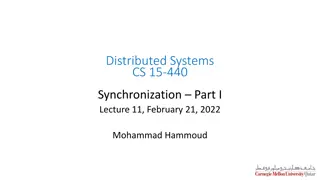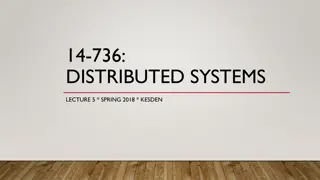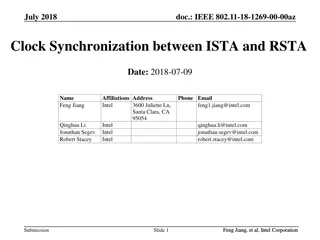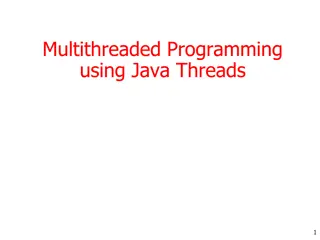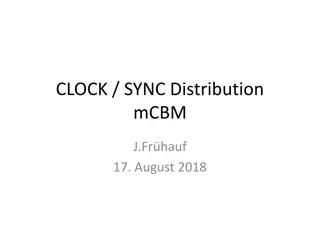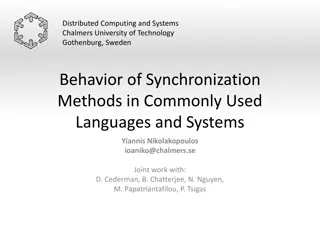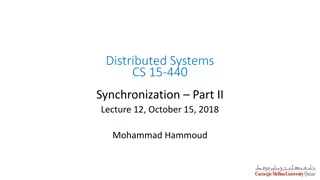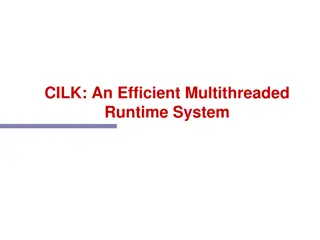Locking and Synchronization in Multithreaded Environments
Exploring the concepts of locking and synchronization in the context of shared resources in multithreaded environments. Covering topics such as thread cooperation, coordination of access to shared variables, and the importance of synchronization mechanisms for controlling execution interleaving. Examples include managing a bank account and dealing with concurrent deposits.
Download Presentation

Please find below an Image/Link to download the presentation.
The content on the website is provided AS IS for your information and personal use only. It may not be sold, licensed, or shared on other websites without obtaining consent from the author.If you encounter any issues during the download, it is possible that the publisher has removed the file from their server.
You are allowed to download the files provided on this website for personal or commercial use, subject to the condition that they are used lawfully. All files are the property of their respective owners.
The content on the website is provided AS IS for your information and personal use only. It may not be sold, licensed, or shared on other websites without obtaining consent from the author.
E N D
Presentation Transcript
Locking and Synchronization
Resources to checkout Linux Kernel Teaching Basic examples of common APIs https://linux-kernel-labs.github.io/master/index.html Rule of thumb for web based tutorials/wikipedia/Hacker News I can see how this circuit can appear to work, but it clearly wasn't designed by someone that really knew what they were doing. In general, if you see a arduino in a circuit you find on the 'net someplace, especially a simple one, assume it was posted because the author considers it a great accomplishment. Those that know what they are doing and draw out a circuit like this in a minute don't consider it worth writing up a web page on. That leaves those that took two weeks to get the motor to spin without the transistor blowing up and they're not really sure what everything does to write these web pages. - https://electronics.stackexchange.com/questions/95140/purpose-of-the- diode-and-capacitor-in-this-motor-circuit
Shared Memory Thread Synchronization Threads cooperate in multithreaded environments User threads and kernel threads Share resources and data structures E.g. memory cache in a web server Coordinate execution Producer/consumer model For correctness, cooperation must be controlled Must assume threads interleave execution arbitrarily Scheduler cannot know everything Control mechanism: synchronization Allows restriction of interleaving Note: This is a global issue (kernel and user) Also in distributed systems
Shared Resources Our focus: Coordinating access to shared resource Basic Problem: Two concurrent threads access a shared variable Access methods: Read-Modify-Write Two levels of approach: Mechanisms for control Low level locks Higher level mutexes, semaphores, monitors, condition variables Patterns for coordinating access Bounded buffer, producer/consumer,
The Classic Example Managing a bank account: int balance; void deposit(int amount) { balance += amount; } int withdraw(int amount){ balance -= amount; return balance; } Suppose account is shared between 2 people What happens if both people go to ATMS and deposit $$?
Cooperating Requires Synchronization Deposit implemented as sequence of ASM instructions void deposit(int amount) { balance += amount; } Load R1, balance Add R1, amount Store R1, balance What happens if two processes call deposit at same time? Process 1 Process 2 Load R1, balance Add R1, amount Store R1, balance Load R1, balance Add R1, amount Store R1, balance Race Condition: Result depends on operation interleaving
Interleaved Schedules Execution of the two threads can be interleaved Assume uniprocessor w/ preemptive scheduling Load R1, balance Add R1, amount Context Switch Instruction Sequence as seen by CPU Load R1, balance Add R1, amount Store R1, balance Context Switch Store R1, balance What s the account balance after this sequence?
But doesnt the x86 do this for us? X86 allows memory operands CISC (x86) Load/Store Arch (micro ops) HW decoder asm ( addl %1, %0\n , : +m (balance) : r (amount) : ); Load R1, balance Add R1, amount Store R1, balance Answer: NO X86 instructions implemented using micro-ops in HW Instructions decomposed into RISC instructions by CPU decoding logic X86 is load/store under the covers So a single x86 instruction is actually a sequence of micro instructions
The crux of the matter Two concurrent threads access a shared resource without any synchronization Creates a Race condition Output is non-deterministic and depends on timing We need mechanisms for controlling access to shared resources Allows us to reason about program operation Re-introduces determinism Synchronization is necessary for any shared data structure or resource
Mutual Exclusion Mutual exclusion synchronizes access to shared resources Code requiring mutual exclusion for correctness is a critical section Only one thread at a time can execute in critical section All other threads must wait to enter Only when a thread leaves can another can enter
Scheduler assumptions int i = 0; Thread A Thread B while (i < 10) { i++; } printf( A won!\n ); while (i > -10) { i--; } printf( B won!\n ); Who wins? Is it guaranteed that someone wins? Answer: We cannot know There is randomness in the system (From where?) Interrupts and the scheduler
Easy solution for uniprocessors Problem == Preemption Solution == Disable Preemption Sources of preemption Voluntary preemption: Controlled by thread Involuntary preemption: Controlled by Scheduler or Hardware How? Solution: Disable interrupts and do not give up CPU On Linux w/ a single processor all spinlocks are translated to: asm ( cli ); and asm( sti );
Critical Section Requirements Mutual exclusion Only one process in critical section at a time Progress (Deadlock free) A process in a critical section cannot block Cannot depend on other processes Bounded (Starvation free) Waiting processes must eventually proceed Performance Overhead of entering and exiting a critical section is small (relative to work done inside it) Busy waiting can cause serious problems (spin wait) Fair Don t make some processes wait longer than others
Implementing Critical Sections To implement critical sections, need atomic operations Atomic Operations: No other instructions can be interleaved Examples of atomic operations Memory accesses Loads & stores Cache coherency ensures atomicity Code between interrupts on a single CPU/core But interrupts can happen randomly Must explicitly disable interrupts Special instructions Test-and-Set Compare-and-Swap Etc
But the x86 is not atomic! CISC (x86) Load/Store Arch (micro ops) HW decoder asm ( addl %1, %0\n , : +m (balance) : r (amount) : ); Load R1, balance Add R1, amount Store R1, balance The x86 offers a special instruction mode that forces atomicity Only for a single instruction!! Lock Prefix: Forces all micro-ops of a single instruction to execute atomically Asserts a lock signal on the memory bus Disallows other CPUs/cores from accessing memory region asm ( lock <instr> ::: )
Critical Section Building Blocks OK we have single instruction atomicity Now what? Build higher level synchronization in OS Abstraction! Memory accesses Test-and-set Compare-and-swap Disable Interrupts Lock memory bus Locks Semaphores Monitors Condition Variables Small set of operations (that absolutely must be correct!!)
Mechanisms for Building Critical Sections Locks Very primitive with minimal semantics Used heavily in kernel Semaphores Basic Easy to understand Hard to use Monitors High level Modern variants require language support (i.e. Java: synchronized) Linux Kernel: Wait queues
Locks Lock: An object in memory that provides 2 operations Acquire(): Called before critical section entry Release(): Called after critical section exit Always called as a pair (Responsibility of the programmer) Between acquire() and release() a thread holds the lock Acquire does not return until lock is held Only one thread can hold the lock at a time What happens when there is a bad programmer? Two basic types of locks: Spinlocks: acquire() busy waits (spins) until lock is acquired Mutexes: acquire() blocks (sleeps) until lock is acquired
Using Locks int withdraw(int amount){ balance -= amount; return balance; } acquire(lock); balance -= amount; acquire(lock) release(lock); int withdraw(int amount){ acquire(lock); balance -= amount; release(lock); return balance; } balance -= amount; release(lock); What happens at the 2nd acquire()? What would happen if this was a uniprocessor and: Acquire(lock) => asm( cli ); Release(lock) => asm( sti );
Using locks badly int withdraw(int amount){ balance -= amount; return balance; } Why not this? Will this work correctly? int main() { int balance = 0; acquire(lock); balance = withdraw(10); release(lock); return balance; }
Using locks badly int withdraw(int amount){ balance -= amount; return balance; } Why not this? Will this work correctly? int main() { int balance = 0; acquire(lock); balance = withdraw(10); release(lock); return balance; } Rules of Thumb: Always try to keep critical sections as small as possible Helps performance, reduces bugs, easier to read, etc Keep locking logic as simple as possible Reduces programmer error, bugs, and cognitive load
Another Bad Example int foo() { int err = 0; acquire(lock); err = can_fail_1(); if (err < 0) { release(lock); return err; } } err = can_fail_2() if (err < 0) { release(lock); return err; } release(lock); return 0;
Another Bad Example int foo() { int err = 0; int foo() { int err = 0; acquire(lock); acquire(lock); err = can_fail_1(); if (err < 0) { release(lock); return err; } err = can_fail_1(); if (err < 0) { goto err; } err = can_fail_2(); if (err < 0) { goto err; } } err = can_fail_2(); if (err < 0) { release(lock); return err; } err: } release(lock); return err; release(lock); return 0;
Another Bad Example static int __foo_unlocked() { int err = 0; int foo() { int err = 0; err = can_fail_1(); if (err < 0) { return err; } acquire(lock); err = can_fail_1(); if (err < 0) { release(lock); return err; } } err = can_fail_2(); if (err < 0) { return err; } } err = can_fail_2(); if (err < 0) { release(lock); return err; } return 0; int foo() { int err = 0; release(lock); return 0; } acquire(lock); err = __foo_unlocked(); release(lock); return err;
Locks without hardware support Its not pretty Peterson s algorithm Assume 2 threads tid -> Thread ID (0,1) int turn = 0; // shared variable bool lock[2] = {false, false}; int withdraw(int amount) { lock[tid] = true; turn = 1 tid; while (lock[1 - tid] && (turn == (1 tid))); // spin balance -= amount; // critical section } lock[tid] = false; return balance; The problem is that this is hard to understand!
Locks with hardware support CPU provides atomic instructions Note that x86 operations are NOT atomic by default, atomicity must be enabled explicitly Two standard instructions: test-and-set, compare-and-swap But there are others (See proj. 1) bool test_and_set(bool * flag) { bool old = *flag; *flag = true; return old; } int compare_and_swap(int * value, int cmp, int new) { int old = *value; if (*value == cmp) { *value = new; } return old; }
Spinlocks Basic form of mutual exclusion Busy wait until a lock is available while (!acquire(lock)); Problems: Wastes resources while trying to acquire lock Under contention utilization goes way down Notes: Only use for very short critical sections Do not sleep with a lock held!
Linux spinlocks /* Initialize spinlock before use */ spin_lock_init(spinlock_t * lock); DEFINE_SPINLOCK(name_of_lock); /* Basic Locking operations */ spin_lock(spinlock_t * lock); spin_unlock(spinlock_t * lock); /* Locking operations with IRQ disabling/enabling */ spin_lock_irqsave(spinlock_t * lock, unsigned long flags); spin_unlock_irqrestore(spinlock_t * lock, unsigned long flags); static DEFINE_SPINLOCK(xxx_lock); { unsigned long flags; } spin_lock_irqsave(&xxx_lock, flags); ... critical section here .. spin_unlock_irqrestore(&xxx_lock, flags);
Mutexes Basic form of mutual exclusion Sleep until a lock is available while (!acquire(lock)){sleep();} Allows lock holder to block (Why is that?) Enables higher CPU utilization (no busy waiting!) More overhead on high contention locks
Linux Mutexes #include <linux/mutex.h> /* functions for mutex initialization */ void mutex_init(struct mutex *mutex); DEFINE_MUTEX(name); /* functions for mutex acquire */ void mutex_lock(struct mutex *mutex); /* functions for mutex release */ void mutex_unlock(struct mutex *mutex);
Reader writer locks Like spin locks for read-mostly data Reading is only sensitive if it is being actively modified If modifications are rare then it doesn t make sense to serialize readers Must make sure not to starve writers acquire(write_lock) acquire(read_lock)
Linux reader/writer locks rwlock_t xxx_lock = __RW_LOCK_UNLOCKED(xxx_lock); { unsigned long flags; read_lock_irqsave(&xxx_lock, flags); .. critical section that only reads the info ... read_unlock_irqrestore(&xxx_lock, flags); } write_lock_irqsave(&xxx_lock, flags); .. read and write exclusive access to the info ... write_unlock_irqrestore(&xxx_lock, flags);
Barriers Synchronize execution into a sequence of stages Mostly used in parallel computation (time steps) Each thread waits until every other thread is at the same location: barrier_wait(&barrier); Once every thread arrives, continue; Ensures that execution occurs in lock step across all threads Barrier Barrier Barrier
Wait Queues Locking for coarse grain task coordination is bad Busy waiting wastes resources How do we use time waiting to do other stuff Example: Waiting for I/O events Asynchronous events can happen any time: How do you detect them? Na ve Solution: Polling on locked data structures Very inefficient (but fast ) Solution: Wait Queues Sleep until an event arrives Require signal from other thread to indicate status has changed Re-evaluate current state before continuing Ties closely with scheduler Lots of options
Linux Waitqs Which waitq you use depends on use case // wait_event - sleep until a condition gets true wait_event(wq_head, condition) // io_wait_event() -- like wait_event() but with io_schedule() io_wait_event(wq_head, condition) // wait_event_freezable - sleep (or freeze) until a condition gets true wait_event_freezable(wq_head, condition) // wait_event_timeout - sleep until a condition gets true or a timeout elapses wait_event_timeout(wq_head, condition, timeout) wait_event_freezable_timeout(wq_head, condition, timeout) wait_event_interruptible(wq_head, condition) wait_event_interruptible_timeout(wq_head, condition, timeout) wait_event_hrtimeout(wq_head, condition, timeout) wait_event_interruptible_hrtimeout(wq, condition, timeout) // And many more
RCU Read-copy-update Replacement for reader-writer locks Does not actually use locks Creates different versions of shared data Modifying data creates a new copy Future readers access new copy Old readers still have old version Must garbage collect Only after all readers are done But how do we know? Quiescent state Place requirements on reader contexts (cannot sleep) Therefore if a CPU with a reader has slept, then reader is done Lots and lots of options Mostly a side effect of implementation decisions
Linux RCU APIs RCU pointer/list update: rcu_assign_pointer list_add_rcu list_add_tail_rcu list_del_rcu list_replace_rcu hlist_add_behind_rcu hlist_add_before_rcu hlist_add_head_rcu hlist_del_rcu hlist_del_init_rcu hlist_replace_rcu list_splice_init_rcu hlist_nulls_del_init_rcu hlist_nulls_del_rcu hlist_nulls_add_head_rcu hlist_bl_add_head_rcu hlist_bl_del_init_rcu hlist_bl_del_rcu hlist_bl_set_first_rcu RCU list traversal: list_entry_rcu list_first_entry_rcu list_next_rcu list_for_each_entry_rcu list_for_each_entry_continue_rcu list_for_each_entry_from_rcu hlist_first_rcu hlist_next_rcu hlist_pprev_rcu hlist_for_each_entry_rcu hlist_for_each_entry_rcu_bh hlist_for_each_entry_from_rcu hlist_for_each_entry_continue_rcu hlist_for_each_entry_continue_rcu_bh hlist_nulls_first_rcu hlist_nulls_for_each_entry_rcu hlist_bl_first_rcu hlist_bl_for_each_entry_rcu
Linux RCU APIs RCU: Critical sections rcu_read_lock rcu_read_unlock rcu_dereference rcu_read_lock_held rcu_dereference_check kfree_rcu rcu_dereference_protected Grace period synchronize_net synchronize_rcu synchronize_rcu_expedited call_rcu Barrier rcu_barrier bh: Critical sections rcu_read_lock_bh rcu_read_unlock_bh [local_bh_disable] [and friends] rcu_dereference_bh rcu_dereference_bh_check rcu_dereference_bh_protected rcu_read_lock_bh_held Grace period call_rcu synchronize_rcu synchronize_rcu_expedited Barrier rcu_barrier
Linux RCU APIs sched: Critical sections rcu_read_lock_sched rcu_read_unlock_sched synchronize_rcu [preempt_disable] [and friends] rcu_read_lock_sched_notrace rcu_read_unlock_sched_notrace rcu_dereference_sched rcu_dereference_sched_check rcu_dereference_sched_protected rcu_read_lock_sched_held Grace period call_rcu Barrier rcu_barrier synchronize_rcu_expedited SRCU: Critical sections srcu_read_lock srcu_read_unlock srcu_dereference srcu_dereference_check srcu_read_lock_held Grace period call_srcu synchronize_srcu synchronize_srcu_expedited Barrier srcu_barrier
Linux RCU APIs SRCU: Initialization/cleanup DEFINE_SRCU DEFINE_STATIC_SRCU init_srcu_struct cleanup_srcu_struct All: lockdep-checked RCU-protected pointer access rcu_access_pointer rcu_dereference_raw RCU_LOCKDEP_WARN rcu_sleep_check RCU_NONIDLE
Transactional memory Embed transaction processing into memory system Memory system tracks memory touched inside critical section (transaction) If another thread modifies same data, transaction aborts Execution returns to initial state Memory contents reset to initial values




